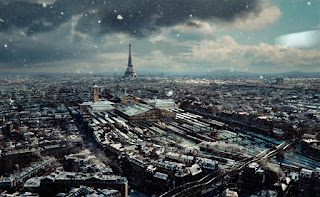 |
| Love-eye-floaters |
They say we dream all the time, but rarely remember unless we happen to wake during a dream. In my dreams I often have memories, for example that I have been in a particular place before - they say this is common, that dreams have their own set of recollections that need not concur with awake memories.
The other night I dreamed I was going along a road - probably running barefoot - and found it didn't go anywhere so retraced my steps back over a river bridge to a junction I had remembered passing. I took the other path hoping that it would lead me back home. This road ended abruptly at the river and I found myself on a boat which took me to city build on either side of a deep valley. My vantage point gave me a panorama of both the complex architecture and the deep, rocky river gorge below. In my dream I remembered that in a previous dream (so I knew I was in a dream!) I had been amazed at the finesse of detail - so I made a point of testing this - I found I could make out striations in the rocks by the river maybe half a mile beneath me, could resolve the guy wires supporting a distant radio mast atop a fantastic building caught in rosy evening light: and the sheer glut of detail surrounding me reminded me of the film Hugo.
I rank Hugo among the best films I have ever watched, along with (to name a few) Oliver, the Sound of Music, Avatar and the new Jungle Book. I rank it highly because (in order) it is intensely beautiful, because it is about a boy discovering himself, because of its unashamedly story-book feel particularly in the way the major characters are so cleverly exaggerated, and because I liked the music. Indeed the only character that comes across at all normal is the boy Hugo himself (Asa Butterfield). Maybe you have not seen the film? You should. Here are some stills to wet your appetite and illustrate what I am saying. In a still, sadly resolution (hence quality, detail) is lost along with the dimensions of time and depth (I strongly regret that I did not see the film in 3D), just as audio quality is lost in monaural listening. The film is one continual feast for the eye - it is impossible to take in all the detail before the scene changes. Click on the images to enlarge them.
Speaking of finesse - the word aptly describes the degree of detail generated by the Fabry–Pérot interferometer. Had I not fallen for the colour and intricacy found in electronics I would surely have become a physicist specialising in optics. I have some friends who are into photography in a big way and they, at least, respect optics, but for the most part folk take sight and the fact that we can see in 3D for granted, not to mention movies and the ubiquitous digital camera to boot. Perhaps you have never taken a camera apart to study the compound lenses, or disassembled a flat screen monitor to find out how it is so evenly illuminated? You should.
Looking at this diagram it is frankly amazing that we can see as well as we can. In fact we can't - the brain adjusts for many imperfections in our eyesight but, together, I reckon they do a pretty good job. I am so glad that I can see. Even if I have largely lost the ability to accommodate - I have needed reading glasses for several years and now even my far vision needs some correction. Recently I invested in a pair of those cheap generic reading glasses with the lowest power and these work well for my far vision though I do not generally need them. Donning them whilst watching a film or movie I discover a new level of detail that I had forgotten existed.
I suppose we all see floaters to varying degrees. And I suppose everyone has "played" with their eyes - screwing up your eyelids to allow only a tiny slit of light to pass through and observing the fancy interference patterns when looking at a source of light. So you will recognise my title picture - these are basically Newton's Rings, which are closely related to the fringes generated by the interferometer. Apparently vision artifacts like this have been observed in distant history: I guess back then they had little else to do than screw up their eyes or build the occasional pyramid.
















This is so interesting! I never knew eye floaters were actually little clumps of gel inside the eye. Thanks for the explanation!
ReplyDelete